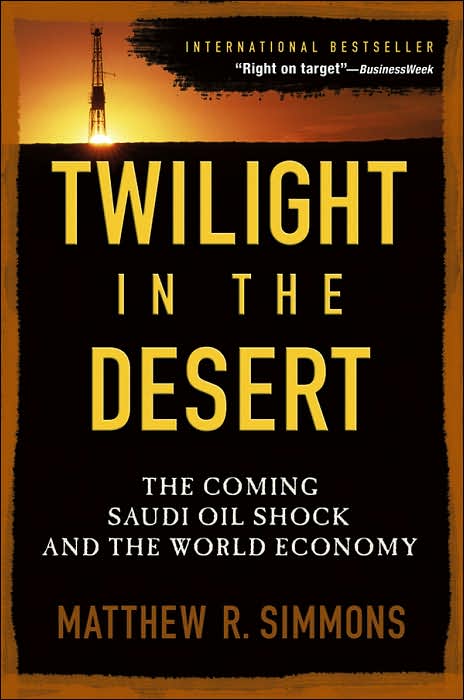
Hat tip to Aaron Edelheit for this PDF of Matt Simmons's PowerPoint presentation to the Commercial Club of Boston last month: "The Oil and Gas System is Sick". I hope it won't ruin any surprise if I tell you that Simmons, the author of the book Twilight in the Desert, thinks oil and natural gas prices are heading much higher. I happen to agree, but I'd feel surer if Simmons offered a compelling explanation for the massive correction in oil and natural gas prices last fall. On p.33 of the PDF he lists three common explanations,
–Speculators left the game that created spike
–Unraveling economy killed off demand
–Gluts are now endemic:
~Tank farms brimming with oil
~Super-tankers now floating oil gluts
■But, none of these “facts” were true.
■Only clear fact: “Crude oil fell 74% in 12 weeks” (September 22nd–December 22nd).
And then on P.34 Simmons offers this,
Are We Missing “The Black Swan?”
■Credit default swap index soared as crude oil plunged.
■Credit freeze began when oil collapsed.
■This had to hurt traders’ ability to own oil contracts.
■If any traders ever had to liquidate contracts, this would cause oil prices to temporarily fall.
■Glencore(aka Marc Rich & Co AG) Energy Trading credit default swaps illustrate the squeeze.
Which seems to contradict his point on the previous slide that the collapse wasn't the result of speculators leaving the game. Perhaps Simmons explicated this during a Q&A.
The image above, of the cover of Simmons's book, comes from Barnes & Noble's website.



4 comments:
The obvious flaw to me is "Credit freeze began when oil collapsed."
The credit freeze wasn't caused by oil collapse, although the oil collapse didn't help matters on the way down.
Hedge funds and other financial institutions losing money had to sell off oil to cover redemptions, maintain capital requirements, etc. Oil ETF's had a lot to do with the cycle going haywire also.
That sounds closer to Jim Rogers's "forced liquidation" theory, that the secular bull market in commodities is still intact but was interrupted by a two or three-times-in-a-century period of forced liquidations. Unless we're headed into a long, L-shaped deflationary recession, I think we'll see a resumption in the upward trends when the economy recovers. I'd be surprised if oil hasn't already bottomed.
The biggest traders in the oil markets aren't the people who actually use the stuff, but financial firms like Goldman Sachs (which was the biggest). I'm not entirely comfortable with futures markets of basic necessities like oil being open to just anyone, because then you get the bubbles and busts of a stock market. If we don't go into along L-shaped recession now, then I'm going to go into cash on any recovery, because one of those is coming. A large recovery of some sort (Dow >11,000) would form a really nasty head and shoulders chart, and since I suspect any near term recovery would be hollow like the 2004-2007 one, then we would be set up for a huge fall from a technical and (probably) fundamental standpoint. But some are calling Dow 5300 the bottom this time around so who knows.
I agree we may have hit bottom in oil, but I think we might retest the lows one more time. But it is probably a good entry point. I'm not comfortable investing in individual Russian companies but maybe a combo of USL and RSX would be a good way to play an oil comeback. Russia is stealing market share from OPEC in a big way.
I'd be surprised by a rally to 11,000 on the Dow in the near term. I could see a rally to 9,000 or 9,500 though. I was about to sell some positions last time we were in that range and then all hell broke loose. Dow 5300 was Cramer's worst case view. I could have made some money had I acted on the implication of his comment about C:
"Citigroup(C Quote - Cramer on C - Stock Picks) is a zombie, and zombies retain optionality, so there's a $1 target here, and it has been reached."
Based on that, buying at $1 for a short-term trade would have made sense. Water over the dam.
Post a Comment